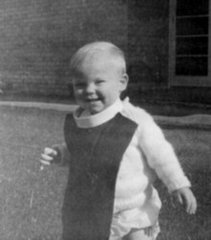The 2005 Snapshot
Australian Speculative Fiction: writers, editors, publishers
Sean Williams
Sean Williams
Interview by Ben Peek
 Publishers have released three of Sean's books recently: The Resurrected Man, The Blood Debt, and Geodesica: Ascent, co-written with Shane Dix. Check the end of the interview for cover images and links to impulse buy. Sean also has a site where you can find many things, including free fiction.
Publishers have released three of Sean's books recently: The Resurrected Man, The Blood Debt, and Geodesica: Ascent, co-written with Shane Dix. Check the end of the interview for cover images and links to impulse buy. Sean also has a site where you can find many things, including free fiction.
1) After 18 novels, 3 short story collections, 60 short stories, and even a stage play, how do you view your body of work as a whole? Are there connecting themes? Is it held together only through genres? Or is it not connected in any way, other than it being the work of Sean Williams?
Themes and connections come and go. Some I'm aware of, some I'm not. Because I often work on two or more books at once, sometimes similar things will creep from one to another. There's a recurring plot-point at the end of both The Unknown Soldier and Metal Fatigue , for example, and (to cite something more recent) The Books of the Cataclysm and Geodesica both deal with themes of changing worlds and grief through very different lenses.
I'm terms of story ideas, I particularly like giving old tropes a bit of a spin, without being too experimental (hence the title of my collection New Adventures in Sci-Fi). Familiar settings include the Australian outback and deep space. Two themes I keep re-visiting are those of parenthood (with particular reference to fathers) and post-humanity.
I've no idea how this is all perceived from the outside. Sometimes I think I should have simplified things by using pseudonyms to separate the various genres, at least. But I seem to be in a minority there. So let it be lumped us one oeuvre under "speculative fiction"--or even "Sci-Fi & Fantasy"--and all will be well.
2) What do you look for when you approach a new project? What has to be there to inspire you, and have those things changed over time?
A friend once accused me of selling out. I said: "No way. I like Star Wars. This will be fun. Come back to me the day you hear I've signed a Star Trek contract and say the same thing. Then you'll be right on the money."
A new book has to be fun, otherwise I won't want to write it, and it'll become even harder work than it already is. Also, I have to feel that I'm doing something new--not necessarily for the genre, although I do aspire to that, but definitely for myself.
There's still so much left to learn. Two projects--a "gothic space opera" and a technothriller--that I'm hoping to write next year score highly on both scales. If they don't sell, there are other projects. There are always other projects...
3) Given the amount of time you've spent in connection to the local scene, what's your impression, both pro and con, of its current condition?
Vastly expanded compared to when I became aware of it (around 15 years ago) and very healthy indeed. I couldn't begin to put a firm number on it, but there must be over a hundred people scattered across the country who'd call themselves practising SF writers, artists, editors, or publishers. And most of us get on. How amazing is that?
A sense of community is immensely important to a niche area like SF. We support each other and are stronger collectively and individually for it. That may sound like some weird kind of political statement, but it's not intended as such. It's what I see--the up side of game theory, hurrah.
4) You're dead. You should never have gone to the circus. You should never have teased the knife throwing midget about his pony. Still, you're dead. You go to Heaven (assuming you believe, so on and so forth) and there's God. You say?
I'd probably say "fuck" a lot, because: (1) I got it all wrong; (2) my father got it all right; and (3) getting it all wrong means an eternity of torment. That's gotta be worth cussing over.
5) Favourite swear word?
Cock.
©2006 Go to top

